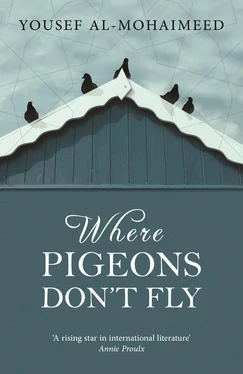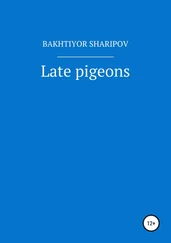After this, Sami was forced to accept the minimum wage for soap actors, and remained without work for a year; they even had to give up his flat and go and live with his family. A new and painful episode in Tarfah’s life began. She argued with his mother over trifling matters and Sami would stalk out of the flat in a temper and be gone for a day or two, while Tarfah stayed behind in the family home, mistreated and downtrodden as a slave. She grew to hate his selfishness and poor behaviour and his running away infuriated her.
Around this time another a major change took place in Tarfah’s life. One day she came across a small, blackened spoon on top of the shade for the bathroom light. Naturally enough, she threw it into the kitchen bin. Two days later she found another spoon, slightly singed. She suspected that he was on something, what she didn’t know, and then she noticed brown crumbs scattered on the carpet beneath his side of the bed. The carpet was light in colour and the crumbs that darkened it she recognised as hashish. He was rolling joints.
She had never noticed the way he smelled before, but after the first year she began avoiding his embraces; he stank and every time he took her to bed it was as though she were a virgin. It felt like rape.
He had no real money, just a modest sum he earned from bit work in television, no more than 3,000 riyals, not even enough to cover his secret budget for a single week. Though they were living with his family he began harping on at her that she should take her expenses from her family and his refusal to shoulder any responsibility caused her irritation to peak.
Then his mother started to unleash her arrows at Tarfah, attributing every new incident, crisis and sudden disappearance to her failure to give birth. She said that if Tarfah had had children Sami wouldn’t leave the house after every argument, as though he wasn’t running away from her sharp tongue and their swapped insults. In order to stop his mother’s crazed assault Tarfah was forced to make repeated visits to a gynaecologist, until after numerous examinations and consultations he threw her out, saying, ‘If your husband isn’t with you next time, don’t come!’
Sami kept promising to come to the doctor with her, and didn’t. He kept promising to start over with her in a flat away from his family, and didn’t. He tried summoning up the spirit of the happy times they had spent together in the flat in Wuroud but she had become a wife in name only and in the end she went back to her family in a rage.
He tried to get her back, making up stupid excuses for why his life had turned out so badly: there were people conspiring against him in television, people in production companies who hated working with him and people plotting to abort his promising start on stage. It was these people who had got him hooked on the delicious giddiness of hashish cigarettes. Even his family hated him for his success and his popularity with the public. With this he lost possession of Tarfah’s respect and her soul. Unable to bear being shut up with him in one place for longer than half an hour she returned to the family home in Suwaidi to put her old room in order, a tiny space more like a cupboard, no larger than twelve square metres.
Though she missed him and longed for him for the first few months, Tarfah eventually got used to living on her own, despite her brother’s badgering her to go out and see her friends. Her brother Ahmed, meanwhile, felt that his unshakeable conviction that artistic and celebrity circles were filthy and depraved had been vindicated and whenever there was slightest problem at home he would chastise his sisters and mother for casting Tarfah into such iniquity.
— 41 —
STOPPED AT THE UWAIS Mall traffic lights on Ulaya Street, Fahd tried opening the bag and discovered that it was secured with a combination lock. He entered a few guesses. Three numbers wasn’t difficult, but nor was it easy. The year of his father’s birth, minus the millennium: 956. No response. He put in 985, the year of his own birth. No response. After a few more failed attempts, the year of the mosque’s occupation occurred to him, 979, but it didn’t open to that, either. What if he tried a nice round number? Fahd asked himself, like the hijri date of the same incident: 400. To his surprise, it opened.
He was parked in Ruman Street just off the Northern Ring Road, beneath the building where Saeed lived. The smell of rot spread through the car’s interior, masked by the reek of cheap perfume. His nostrils twitched and he started to sneeze, then he switched on the light and gazed upon the bag’s secrets.
He began to leaf through the documents and diaries, the books marked with their date of purchase from Mecca’s bookshops and the pamphlets containing Juhayman’s addresses, one of which his father had distributed that Ramadan to the worshippers in the Grand Mosque. Fahd read the titles. A weighty tome turned in his hands: Apprising the People of the Signs of Discord and the Portents of the Hour by Hamoud al-Tuwaijri. He opened it and a light cloud of dust rose towards his face. He closed his eyes, opened them again, and on the page before him read:
Concerning the man of Qahtan
Qais Bin Jaber al-Sadafi relates a hadith handed down from his grandfather, by way of his father, that the Prophet, the blessings of God and His peace be upon him, said:
‘After me there shall be Caliphs, and after the Caliphs, Emirs, and after the Emirs, Kings, and after the Kings, Tyrants. Then shall come a man of my House, to fill the earth with justice after it has been filled with tyranny. Then shall the man of Qahtan be made Emir. In the name of He who sent me the True Word, it shall be no other.’
This account is given by al-Tabrani; Al-Haithami said of it:
‘In its chain of transmission are names I do not know.’
We also have the account of Abdallah Bin Amr Bin al-Aas — may God be content with him and his father before him — in which we find the following:
‘Then shall come the Zealous Emirs. Six shall be born of the line of Kaab Bin Luay, one shall be a man of Qahtan and all shall be righteous and without equal.’
Abu Harira, may God be content with him, relates that the Prophet, the blessings of God and His peace be upon him, said:
‘The Hour shall not arrive until a man from Qahtan comes forth and drives the people before him with his staff.’
Fahd shut the book and hefted another, which he recognised from the cover: Sayyid Qutb’s Milestones . He took a number of small pamphlets and read some of their covers: The Emirate, The Oath and Obedience, Exposing the Rulers’ Deception of Scholars and Men and Sincere Advice and Justice in the Life of Man . He lifted a small, yellow booklet of only a few pages, whose cover proclaimed: A Vindication of the Religion of Abraham, Upon Him be Peace .
In the margins of these pamphlets he read the comments in his father’s shaky hand: The position on civilisation … peaceful evangelising … jihad … compliance … the Religion of Abraham … obedience …
Lifting these books up, Fahd came across a series of letters to his father, a small folder with diary entries and a number of documents. One was a fatwa dated 20 November 1979:
In the name of God, the Compassionate and the Merciful, Praise be to God alone and Peace upon His Prophet, His family and His companions:
On Tuesday, the first day of the month of Muharram in the year 1400, we, the below signed, were summoned by His Majesty King Khaled Bin Abdul Aziz Al Saud to attend him in his office in Maadhar.
His Majesty informed us that directly following dawn prayers that day a group had entered the Grand Mosque bearing arms and demanded the oath of obedience be given to one they called the Mahdi. They swore the oath and prevented people from leaving the mosque, fighting those who opposed them and opening fire on people both within the mosque and outside.
Читать дальше












